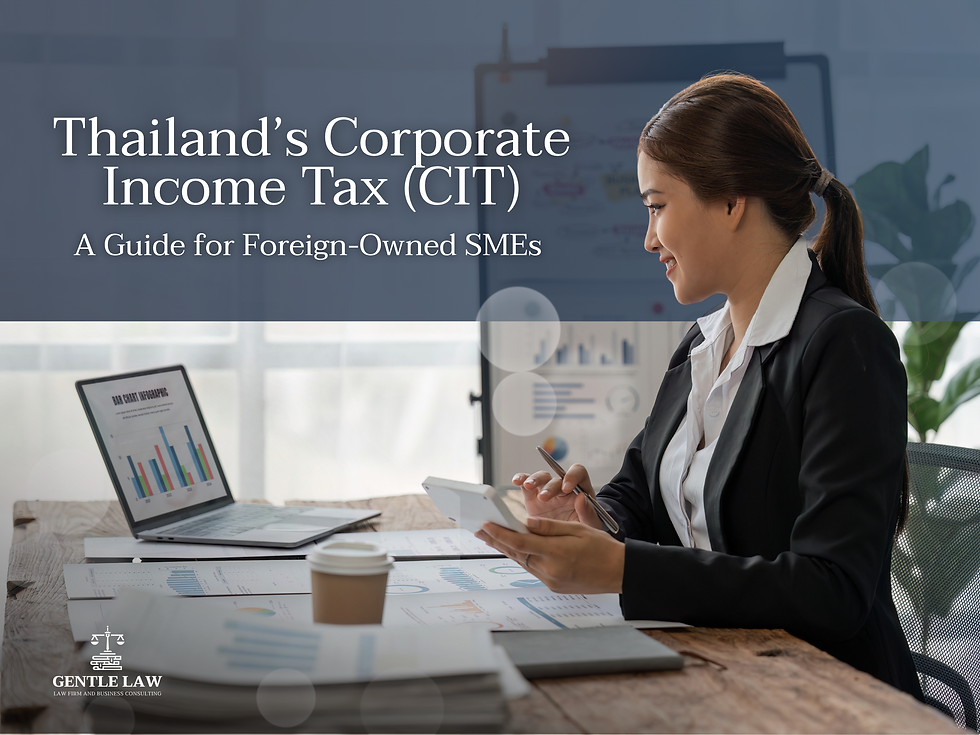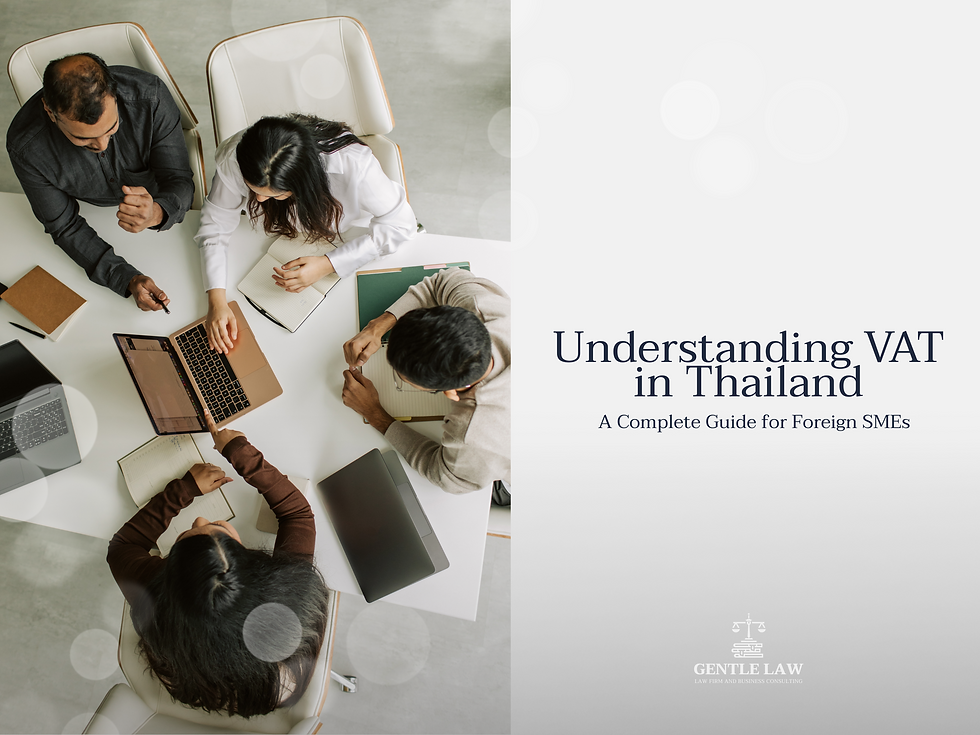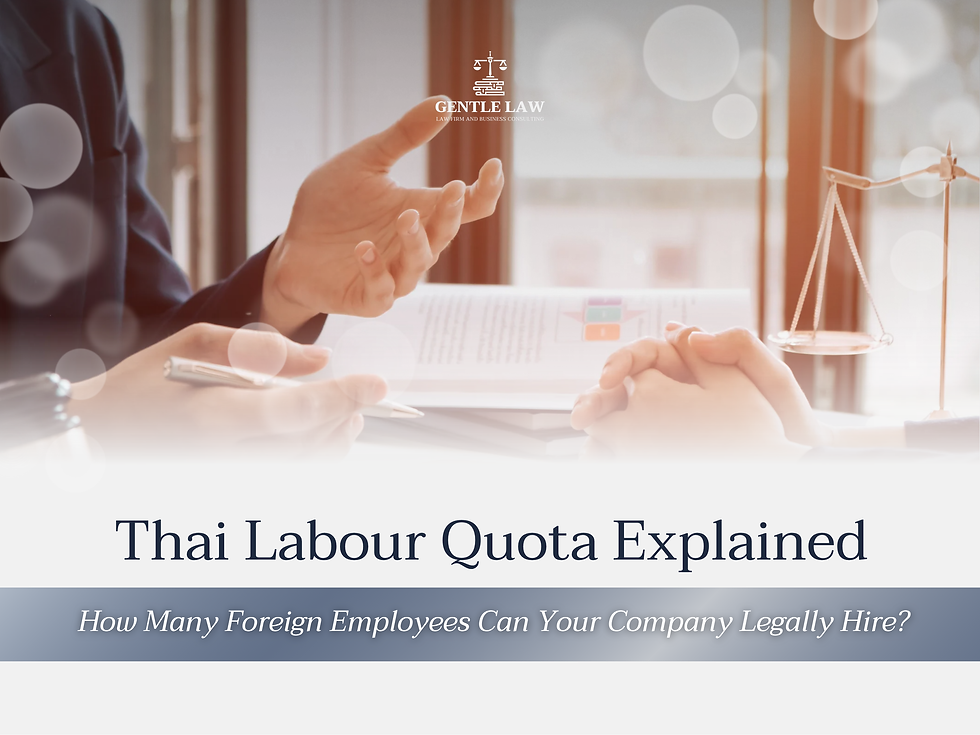Thailand’s Corporate Income Tax (CIT) for Foreign-Owned SMEs: A Legal and Strategic Guide
- gentlelawlawfirm
- Jul 30, 2025
- 3 min read

Understanding Corporate Income Tax in Thailand for foreign-owned SMEs is vital for effective tax planning and legal compliance. Thailand’s CIT regime is unique in structure, offering specific incentives for small and medium-sized enterprises (SMEs) and BOI-promoted businesses. This guide from GENTLE LAW IBL, your trusted legal advisor for international businesses in Thailand, will clarify the legal framework and help you optimize your tax position.
📌 What Is Corporate Income Tax in Thailand?
Corporate Income Tax (CIT) in Thailand is governed by the Revenue Code of Thailand. It is levied on net profits generated by juristic entities carrying on business in Thailand.
Standard CIT Rate: 20% on net taxable profit
Legal Basis: Sections 65–70 of the Revenue Code
✅ SME CIT Rates Under Thai Law
The Thai Revenue Department provides preferential CIT rates for qualifying SMEs under Royal Decree (No. 530) B.E. 2554 (2011):
Taxable Net Profit (THB) | CIT Rate |
0 – 300,000 | 0% (SME Incentive) |
300,001 – 3,000,000 | 15% (Reduced SME Rate) |
Above 3,000,000 | 20% (Standard Rate) |
Qualification Requirements:
Paid-up capital ≤ THB 5 million (at fiscal year-end)
Annual revenue ≤ THB 30 million
👉 These criteria are verified annually by the Revenue Department. Ensure accurate classification to avoid legal exposure.
🧾 Key CIT Filing and Payment Deadlines
Complying with deadlines under Thai tax law is essential to avoid penalties. Relevant forms and timelines include:
Filing Type | Legal Form | Deadline |
Annual CIT Return | PND 50 | Within 150 days after fiscal year-end |
Interim (Half-Year) CIT Return | PND 51 | Within 2 months after first 6 months |
Estimated Tax Payment | PND 5 | 2 installments (25% each) as prescribed |
Legal Consequences for Late Filing:
Penalty: 1.5% interest per month on unpaid tax
Administrative Fine: THB 2,000/month (max THB 20,000)
💡 Common Deductions and Allowances Under Thai Law
Foreign SMEs in Thailand can legally deduct the following, subject to Revenue Code provisions:
Ordinary business expenses (rent, utilities, salaries, etc.)
Employee-related costs: Social Security Fund and Provident Fund contributions
Depreciation as per Royal Decree No. 145
R&D expenditure (up to 300% if BOI-promoted per BOI Announcement No. 2/2560)
Marketing and advertising expenses
📌 All deductions must be substantiated by official tax invoices and supporting documents, as per Section 65 Ter of the Revenue Code.
⚠️ Common Pitfalls and Legal Implications
Pitfall | Consequences under Thai Law |
Classifying personal as business | Deduction disallowed; possible back tax assessed |
Withholding tax omission | 1%–15% penalty on unpaid withheld amounts |
Missing BOI-related deductions | Loss of up to 8 years of tax exemption |
Incorrect depreciation schedules | Adjustments during audit + surcharge |
Late interim payments | 1.5%/month interest under Section 26 |
🧠 CIT Incentives for BOI-Promoted Companies
The Board of Investment (BOI) provides CIT exemptions and reductions under the Investment Promotion Act:
3–8 years CIT exemption on net profits (for promoted activities)
50% CIT reduction for 5 years after exemption expires (Zone-dependent)
Import duty exemption on machinery and raw materials
📌 BOI incentives are subject to application approval and strict compliance reporting.
📈 Strategic CIT Optimization Tips for Foreign-Owned SMEs
Corporate Income Tax in Thailand for foreign-owned SMEs
Align Fiscal Year Strategically: Match with business cycles for cash flow optimization.
Leverage R&D Allowances: Especially for tech or manufacturing ventures.
Structure Entities for BOI Eligibility: Choose activities and zones strategically.
Track VAT and Withholding Obligations: Avoid secondary penalties.
Use Local Expertise: Ensure ongoing compliance with Thai Revenue Code updates.
📌 How GENTLE LAW IBL Supports Your CIT Compliance
At GENTLE LAW IBL, we ensure that foreign SMEs operating in Thailand receive legal and tax planning advice that aligns with real laws and effective business strategy.
Our Corporate Tax Services include:
SME status and eligibility analysis (based on capital and revenue)
BOI structure planning to maximize tax holidays
Preparation and filing of PND forms (50, 51, 5)
Internal compliance audits to reduce audit risk
Legal representation in tax disputes
📊 Clients of GENTLE LAW IBL consistently reduce their effective tax rate while remaining compliant.
🧾 Final Thoughts on Corporate Income Tax in Thailand for Foreign-Owned SMEs
Corporate Income Tax in Thailand for foreign-owned SMEs doesn’t need to be a burden. With the right structure, documented deductions, and expert guidance, you can reduce liabilities, improve cash flow, and operate with full compliance.
📩 Ready to optimize your corporate tax structure in Thailand?
Contact GENTLE LAW IBL today for a tax consultation tailored to your business.



